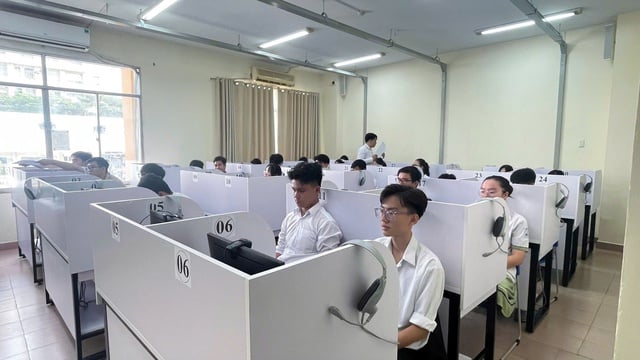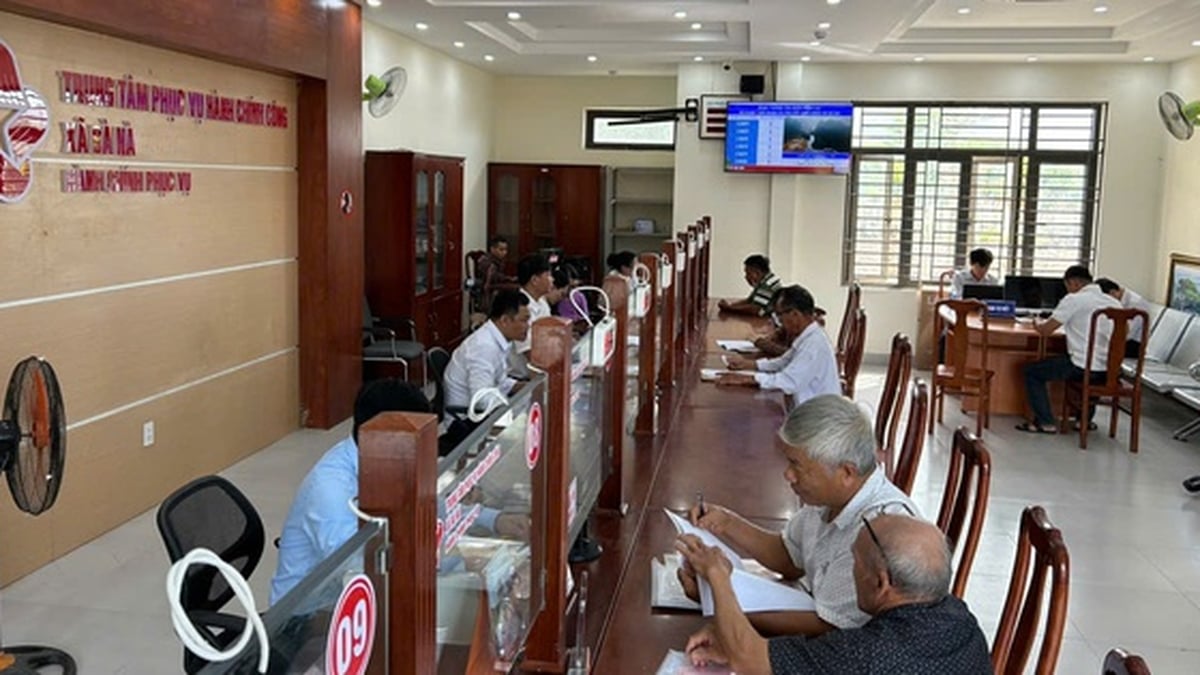This is a strong signal of determination for innovation, but also poses many challenges as there is not much time left to prepare.

Candidates participate in the 2025 specialized competency assessment exam of Ho Chi Minh City University of Education on computer
PHOTO: HA ANH
International experience and lessons for Vietnam
Many countries such as the US, Australia, Singapore, and South Korea have long applied computer-based testing, not only in national exams but also in periodic tests and standardized output tests. For example, the US SAT exam has completely switched to digital testing since 2023. Singapore organizes O-Level and A-Level exams with many subjects being supervised online. South Korea also invests heavily in national standard computer testing centers.
What these countries have in common is thorough preparation with a long-term roadmap; investment in technology infrastructure and network security; building standardized test databases and electronic question banks; training teachers and technicians and providing guidance to candidates.
Vietnam can learn many things, but cannot copy mechanically. It needs to be adjusted to suit practical conditions, especially the digital gap between regions. Instead of implementing massively, it needs to be piloted in ready localities, then expanded based on serious evaluation.
Organizing exams on computers is not new in the world . Many developed countries have implemented it for many years and achieved positive results thanks to cost savings, ensuring transparency, reducing cheating and better reflecting students' abilities. In Vietnam, the high school graduation exam is still mainly based on paper exams, which are expensive and lack flexibility in the digital transformation conditions.
The Prime Minister's directive on piloting computer-based exams from 2027 shows a long-term vision and determination to promote digital transformation ineducation . The Ministry of Education and Training is currently developing a specific plan, in which a number of localities with good infrastructure conditions will be selected for the pilot, from which the scale will be gradually expanded. The most important thing is that this transformation cannot be implemented overnight but requires consensus, investment and serious preparation from many sides.
REASONS TO TAKE HIGH SCHOOL GRADUATION EXAM ON COMPUTER
There are at least three reasons why computer-based high school graduation exams are a necessary direction.
First, computer-based testing allows for flexibility in multiple sessions, rather than being concentrated at a single time. This is consistent with the goals of differentiating students and moving towards recognizing results multiple times a year, as some countries are doing.
Second, computer-based testing helps shorten the grading process, quickly announce scores, and minimize errors due to human factors.
Third, computer-based test formats can be designed more diversely, from objective tests to interactive forms, thereby more accurately assessing the true abilities of learners.
Finally, computer-based testing is an important link in the digital education ecosystem that Vietnam is gradually building, from digital learning materials, smart classrooms, management software to online competency assessment.
With practical benefits and requirements from the Government , the Ministry of Education and Training is also actively implementing. Recently, Deputy Minister of Education and Training Pham Ngoc Thuong said that according to the roadmap, the Ministry will issue a pilot project for high school graduation exams on computers this year. The organization of exams in this form is expected to start from 2027 in qualified localities.
CHALLENGES TO OVERCOME
Despite its many benefits, switching to computer-based testing is not easy. The first problem is technical infrastructure. Currently, many localities, especially remote areas, do not have enough computers, have weak internet connections, and lack facilities. Without strong investment, computer-based testing will create new inequalities in education.
The human factor is extremely important. Teachers, administrators, students and parents need to be trained and familiarized with the new method. Fear of new things, technical risks or unfairness are inevitable. Therefore, a step-by-step roadmap and active communication are needed to create consensus.
To implement computer-based exams, the legal system and organizational framework need to be improved. Computer-based exams entail a series of changes in regulations, monitoring procedures, methods of securing exam papers and papers, and preventing high-tech cheating. These need to be carefully considered and issued early for testing.
Computer-based testing is not only a change in the form of testing, but also a change in the way of thinking in teaching and learning. Students will no longer be able to just learn by rote or memorize to do paper-based tests, but need to develop logical thinking skills, reading comprehension, analysis, and information processing. Parents are also assured, confident in the innovation of the industry and encourage their children to study and take the test.
Teachers also need to change the way they prepare lessons, test and evaluate regularly towards digitalization.

Candidates for the 2025 high school graduation exam. The Ministry of Education and Training is preparing conditions to pilot the organization of this exam on computers from 2027.
Photo: Ngoc Duong
NO WAIT FOR QUALIFICATIONS, CAN BE DONE STEP BY STEP
Digital transformation in examinations is part of the comprehensive digital transformation of the education sector. Therefore, we cannot wait until all conditions are met to start, but need to do it step by step, focus on it and evaluate it continuously.
First of all, it is necessary to conduct a comprehensive survey of the IT infrastructure conditions of general schools across the country to classify their readiness levels. From there, select localities and school clusters that are capable of piloting the program as early as 2026.
Next, it is necessary to build a standardized, highly secure electronic test bank, and at the same time train the test-making and grading teams on the digital system. This is the key step to ensure the quality of the exam.
It is necessary to design periodic tests on computers during the learning process so that students can get used to it. This can start from grade 10 and grade 11, helping to reduce unexpected pressure when taking real exams.
In addition, the Ministry of Education and Training needs to issue regulations for online exams, which clearly stipulate the organization process, handle technical problems, ensure fairness, transparency and data security. Regulations need to be developed early and widely consulted.
Finally, coordination between ministries, branches and localities is needed to have synchronous investment resources: from computer equipment, internet network, building software systems in accordance with regulations and ensuring safety, security and ease of use, to teacher and technical training.
Many people worry that computer-based testing will make the exam too "technological" and lose its humanity. However, it is important to understand that technology is just a tool. The ultimate goal of testing is still to accurately assess the learner's ability, aiming for fairness, transparency and saving social resources. If computer-based testing helps achieve that goal better, then it should not be delayed.
The problem is how we approach it, not following the trend, not being extreme in denying the traditional exam format, but needing to combine it flexibly. Maybe in the first stage, some subjects will still be tested on paper, some subjects will be tested on computers. After a few years, when all conditions are ripe, we will move towards full implementation.
Computer-based high school graduation exams are an inevitable trend. The Prime Minister’s directive is a clear reminder that the education sector cannot stay out of the digital revolution. But the road from idea to practice is long and challenging. If we do not start today, we will continue to lag behind the world.
Source: https://thanhnien.vn/dieu-kien-thuc-hien-thi-tot-nghiep-thpt-tren-may-tinh-tu-nam-2027-185250708220324507.htm
































































































Comment (0)